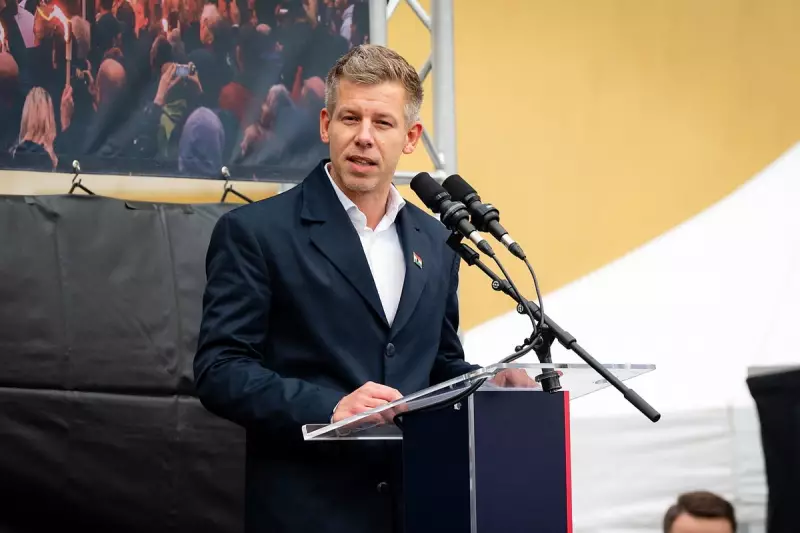
Hungary is witnessing its most dramatic political transformation in decades as Prime Minister Viktor Orbán confronts an unprecedented challenge from former ally Péter Magyar, whose surging popularity in rural areas threatens to end the nationalist leader's twenty-year dominance.
The Rise of a Challenger
With parliamentary elections still five months away, the campaign has already intensified into what many observers describe as the greatest threat to Orbán's political career. The Prime Minister, first elected in 1998 and serving four consecutive terms since 2010, now faces a formidable opponent in Péter Magyar, a 44-year-old former insider from Orbán's own Fidesz party.
Magyar has launched a scathing critique of the government he once served, telling The Associated Press: "Viktor Orbán's despicable, corrupt government will do everything to preserve their stolen loot and their power. This power cannot be reformed, it is not able to regain contact with the people. This power has become inhumane."
Recent polling reveals a remarkable shift, with Magyar's Tisza party establishing a solid lead over Fidesz—an achievement nearly unheard of for any opposition force during Orbán's lengthy tenure.
Grassroots Momentum in Rural Heartlands
András Bíró-Nagy, director of the Budapest-based Policy Solutions think tank, attributes Magyar's success to his relentless grassroots campaigning in rural Hungary. Unlike previous opposition figures, Magyar has focused on bread-and-butter issues like the cost of living and inadequate public services, resonating deeply in small towns that traditionally supported Orbán's nationalist message.
The campaign's momentum was evident during Magyar's recent visit to Tab, a community of fewer than 4,000 people in southwestern Hungary. Hundreds packed the town's socialist-era community centre for what Magyar calls his "Road to Victory" tour.
Erika Bognár, a 76-year-old widowed retiree, voiced the frustration of many Hungarians: "Everywhere in the shops people are grumbling they can't make ends meet. We live in misery, we have been pushed completely into misery." Her monthly pension, she declared, was insufficient for survival, and she demanded "a system change, because this system sucks."
This economic discontent reflects broader challenges facing Hungary. The European Union has frozen approximately €14 billion in funding over rule-of-law and corruption concerns, exacerbating the country's chronically stagnant economic performance.
Battle Lines: War, Peace and Democratic Integrity
Orbán has responded by portraying Magyar as an existential threat, alleging that his inexperience and foreign allegiances could bankrupt Hungary and drag it into the war in neighbouring Ukraine—claims Magyar strongly denies.
The Prime Minister has maintained a distinctive position within the EU, refusing to supply Ukraine with economic aid or weapons against Russia's full-scale invasion. He has characterised supporting countries as warmongers and compared the EU to the Soviet Union that dominated Hungary for decades.
In an October speech to tens of thousands of supporters, Orbán declared: "Whoever thinks that they support a change in government is in reality supporting the war, whether they know it or not. Brussels today is not a source of help, but a source of danger."
This message is amplified by what critics describe as a tilted political playing field. András Bíró-Nagy notes that previous Hungarian elections were deemed "free but not fair" by the Organization for Security and Cooperation in Europe, which identified a "pervasive overlap" between Fidesz and government messaging.
Sándor Rofrics, a local Tisza activist in Tab, expressed concern about the campaign's fairness: "Money is no object for Fidesz, even state money. They will spend a lot of public money on this campaign."
Magyar acknowledges his party's resource disadvantage, describing the contest as a "David and Goliath" struggle against "a machine with a full arsenal—propaganda, secret services, unlimited government money."
Despite these challenges and his party's current lead in polls, Magyar remains cautious about underestimating his opponent: "He is an experienced player and has a lot to lose in this election, perhaps more than just the prime minister's seat."
With five months remaining until Hungarians cast their ballots, the political battle promises to intensify, potentially reshaping not only Hungary's future but its relationship with Europe and the ongoing conflict in Ukraine.





